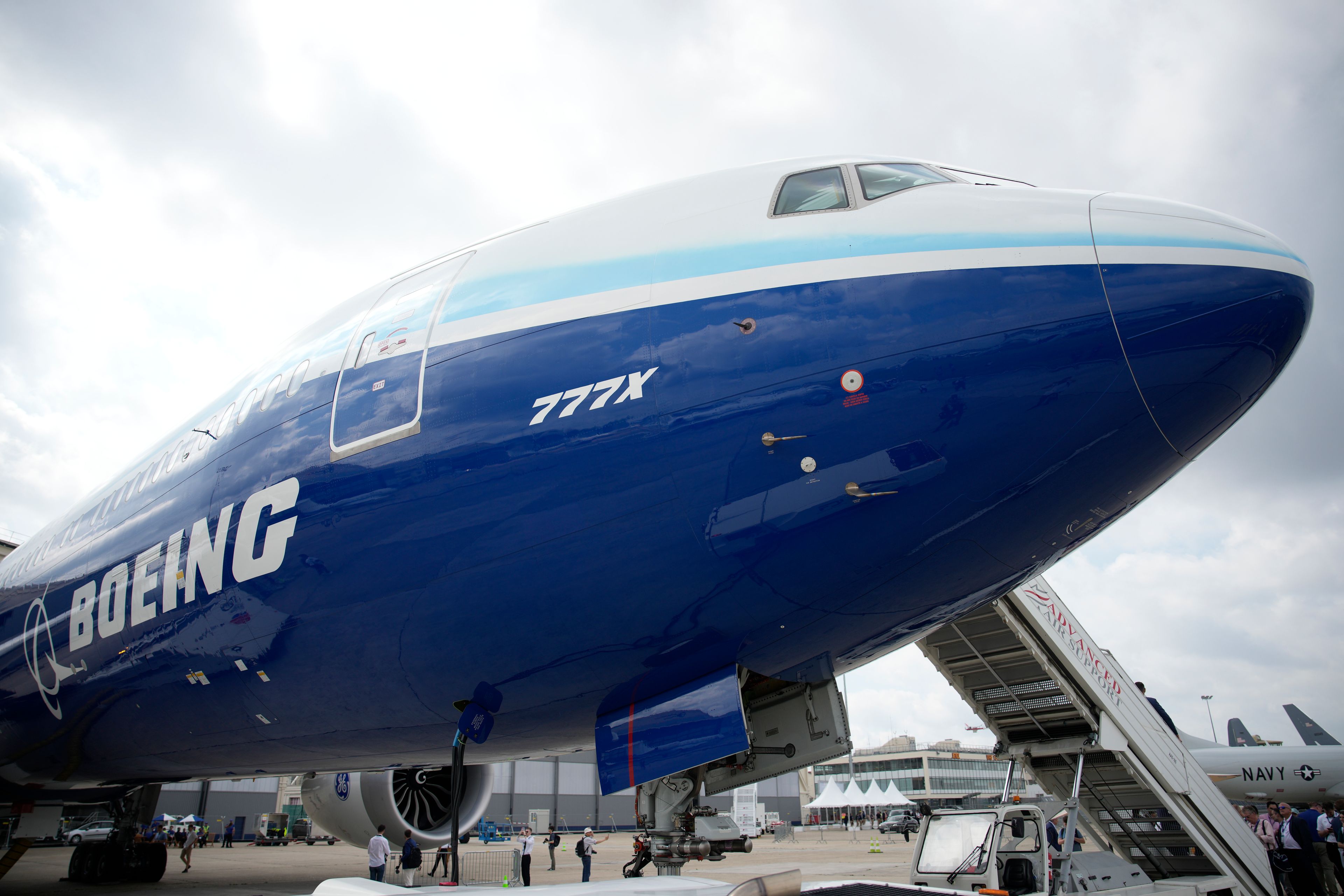Executives confident Boeing will have big turnaround
Company reports it lost $1.4 billion in 3 months
Despite a disappointing financial quarter that saw Boeing lose $1.4 billion in three months, executives are confident the company will bounce back soon under the leadership of incoming CEO Kelly Ortberg.
Boeing is taking hits to its production rate and balance sheet now to set itself up for long-term success, outgoing CEO Dave Calhoun told analysts on a call last week.
The “game plan” so far has included acquiring troubled supplier Spirit AeroSystems, investing in training and maintaining a low rate of production to improve safety and quality on the factory floor.
On Wednesday, Boeing made another call when it announced Ortberg, former chief of avionics equipment and technology company Rockwell Collins, would take over as CEO next month.
Ortberg’s appointment was met with optimism from analysts who hope his engineering background — and his distance from Boeing’s recent mishaps — could lead the company to stability.
But he’s stepping into a minefield.
Boeing faces renewed regulatory oversight after a panel exploded off an Alaska Airlines 737 MAX flying out of Portland. It recently pleaded guilty to a criminal fraud charge stemming from two fatal 737 MAX crashes. It’s still awaiting certification for two new MAX models and the largest version of its 777 widebody jet. Thousands of its union machinists may walk off the job in September.
And the company keeps losing money.
Slow production rates following the Alaska Airlines blowout and fixed costs from its defense division led to a $1.4 billion loss in the second quarter this year, Boeing reported Wednesday. The company’s last profitable quarter was two years ago.
Revenue overall was down 15% to $16.9 billion, with Boeing’s Commercial Airplanes division and Defense arm reporting losses. Deliveries of commercial planes were down 32% compared to the same quarter last year.
But, Calhoun told analysts, Boeing’s recent investments will pay off in the decades ahead.
“We’re taking the time now to ensure our (commercial airplane factories) are positioned to ramp production in a stable fashion for years to come,” Calhoun said. “Entering 2025, we’ll be in a much stronger position because of the work we’re doing now.
“The fundamentals are there for the next 20 years.”
Production missteps
Boeing’s Commercial Airplanes division delivered 92 planes in the second quarter, a 32% drop from the 136 planes delivered in the same quarter last year. Revenue fell more than 30%, from $8.8 billion in the second quarter of 2023 to $6 billion this year.
Production of Boeing’s 737 MAX jet ground to a halt in January after the panel blowout, but it has steadily increased, the company said, from low single digits at the start of the year to nearly 20 MAX planes per month in June and July.
Boeing says it’s on track to reach the Federal Aviation Administration’s mandated cap of 38 MAX planes per month by the end of the year.
The slowdown in its Puget Sound factories has also affected Boeing’s Defense division, the company said Wednesday, particularly its Everett-based KC-46A tanker program.
The Defense arm lost a total of $913 million in the second quarter, compared with a loss of $527 million in the same period last year. This quarter’s results included $1 billion in losses from four fixed-price development programs.
Defense revenue dropped 2% to $6 billion.
Boeing’s Global Services sector remains a bright spot for the company. It reported a 3% increase in revenue, up to $4.8 billion.
Calhoun said Wednesday he expects the losses to turn around because customer demand is “still so strong.”
“That provides the incentive for everyone to get us money so they can get their plane,” he said.
But, analysts at Agency Partners said earlier this month that the industry may be headed toward a “civil aviation recession.” Boeing, the analysts continued, may have run out of time to generate cash and reduce its debt before the upturn draws to a close.
“Distractions” clear
Aerospace analysts from Bloomberg Intelligence felt differently. In a note to investors earlier this month, analysts said Boeing appeared set to ramp up production and get back on track as “distractions begin to clear.”
Those distractions included a $4.7 billion agreement to buy troubled supplier Spirit AeroSystems and a pending plea deal with the Justice Department that will allow Boeing to avoid a criminal trial following a fraud conviction.
Boeing recently agreed to the deal to resolve a criminal fraud charge following two fatal 737 MAX crashes five years ago. The plea agreement, which faces opposition from the families who lost loved ones in those crashes, would require Boeing to pay a $243.6 million fine, make a $455 million investment in safety and compliance programs and allow oversight from an independent monitor to reduce the risk of misconduct.
Analysts from Bloomberg said the cost of the deal wouldn’t be a “problem for the company” and the addition of the independent monitor would be “burdensome.” There’s still some uncertainty about whether the guilty plea would impact Boeing’s government defense contracts, but analysts argue that, in that arena, Boeing is too big to fail.
Boeing also faces a two-day hearing with the National Transportation Safety Board in August to discuss the Jan. 5 panel blowout.
The Spirit Aero acquisition — which includes selling off money-losing portions of Spirit to Boeing rival Airbus — signaled to analysts that Boeing may be able to dig itself out of its production slowdown.
On Wednesday, Calhoun said Boeing is already seeing a difference in the fuselages that come to Renton from Spirit’s factory in Wichita, Kan. Following the panel blowout, Boeing began inspecting the fuselages in Wichita before they were shipped to Renton to avoid having to remove parts and make changes later in the factory, increasing the risk for error.
“We’re now at the stage where we’re only getting clean fuselages,” Calhoun told analysts. “We cannot allow ourselves to get back to a scenario where we’re traveling things too far down the line. We’ve got a lot of controls in place so that won’t happen.”
Earlier this month, Boeing cleared another hurdle when the FAA granted authority for it to start test flights needed to win approval for the 777X to enter passenger service. That could unlock new orders after years of delay.
Calhoun said last week the company had identified a solution to another issue plaguing the airline — a flaw in its anti-icing system. Calhoun said the solution will be implemented and verified next year.
Looming labor negotiations
In the coming months, Boeing is expected to face increased labor costs as it works to complete its acquisition of Spirit in 2025 and finalizes a new contract with the union that represents Northwest machinists.
Members of the International Association of Machinists and Aerospace Workers have asked for up to a 40% raise, resulting in a 1.5% to 2% increase in production costs per plane, according to an analysis from Bloomberg Intelligence.
The machinists voted earlier this month to authorize a strike if Boeing did not offer a contract that met their demands before the current agreement expires in September.
Calhoun said Boeing hopes to avoid a strike.
He’ll be gone by the time those negotiations come to a head this fall. Instead, it will land in Ortberg’s and other Boeing executives’ “backyard,” Calhoun said.
Boeing’s leadership transition may be an extra incentive for the company to reach a deal with the union, hoping to avoid a work stoppage weeks after installing a new chief executive “who is intended to help Boeing turn over a new leaf,” analysts from J.P. Morgan said in a note to investors Wednesday.
“We believe he is highly respected in the industry, he has important operational and engineering experience, and we think he has the potential to do some of the things Boeing needs most, including restoring relationships with customers, suppliers, regulators and legislators,” the analysts wrote.
Calhoun was not involved in the decision-making process for picking his successor but he “could not be happier with the call,” he said Wednesday.
“I know Kelly; I’ve been around Kelly. He’s a seasoned operator, he’s got experience, he knows what we do for a living,” Calhoun said. “Kelly knows full well we’re in a recovery mode, and he knows full well we’ve got to complete that recovery.”









